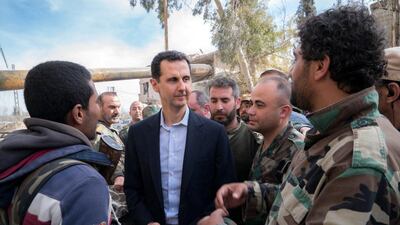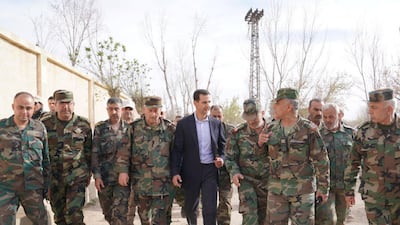A trial over state-backed torture in Syria is set to draw to a close on Thursday when a German court will issue its verdict on the case of former intelligence officer Col Anwar Raslan.
He stands accused of crimes against humanity, involvement in the murder of 58 people and the torture of 4,000 others at the Al Khatib detention centre in Damascus between April 2011 and September 2012.
Prosecutors in Germany, where Mr Raslan fled after deserting the Syrian military in 2012, are seeking a life sentence.
The trial in Koblenz, in which more than 80 people have testified including those previously detained in Syria, is the first to prosecute those accused of carrying out abuse while working for the regime of Bashar Al Assad.
Mr Raslan, 58, was put on trial in April 2020 along with low-ranking intelligence agent Eyad Al Gharib, who was accused of helping to arrest and transport protesters to Al Khatib. He was sentenced to four-and-a-half years in prison in February for complicity in crimes against humanity.
Part of the evidence presented against Mr Raslan were photographs of alleged torture victims smuggled out of Syria by a former police officer, who goes by the pseudonym Caesar.
Anwar Al Bunni, a Syrian human rights lawyer who has been involved in the case and was once arrested by Mr Raslan in Syria, said the trial marked an important step in holding the Assad regime to account – but hoped it would not be the last.
“We worked hard, and victims, the witnesses gave all they had to reach this moment. I am so happy – not for me – for the victims, for the Syrian future,” he told The National.

Mr Al Bunni was arrested numerous times in Syria during his decades defending political prisoners.
Meanwhile, Mr Raslan is accused of working for 18 years in the Syrian intelligence services, steadily rising through the ranks.
Prosecutors allege that he oversaw rape and sexual abuse, "electric shocks", beatings with "fists, wires and whips" and "sleep deprivation" at the prison.
Mr Raslan has repeatedly denied any responsibility, maintaining he had "neither beaten nor tortured" prisoners and had "never acted inhumanely".
He said he "did not and would not condone" the abuse committed by the Syrian regime and felt "regret and compassion" for all victims.
Human Rights Watch described the trial as a “watershed moment for torture survivors and international justice”.
It was made possible by the principle of universal jurisdiction, which allows offences to be prosecuted even if they were committed in a foreign country. “I think Syrians are very grateful,” Mr Al Bunni said, for the legal situation that allowed the trial to take place in Germany. He voiced his hope of bringing "some justice for the victims, for Syrians”.
Balkees Jarrah of Human Rights Watch said: “These prosecutions are an increasingly important part of international efforts to provide justice to victims who have nowhere else to turn, deter future crimes and help ensure that countries do not become safe havens for human rights abusers.
“The trial in Koblenz is a message to the Syrian authorities that no one is beyond the reach of justice.”
Regardless of the verdict in Mr Raslan’s case, lawyers – including Mr Al Bunni – are pursuing others accused of abuse through Europe's courts.
Legal proceedings have been launched in Austria, the Netherlands, Norway and Sweden, while a Syrian doctor accused of torture, murder and crimes against humanity is due to start in Frankfurt this month.
Mr Al Bunni left Syria in 2014, arriving in Germany and setting up the Syrian Centre for Legal Studies and Research to defend prisoners of conscious and hold to account those who breach human rights.
In 2014, he recognised Mr Raslan in a Berlin supermarket – the two men some of the 800,000 Syrians who have sought refuge in Germany since 2011 – but he insists the Koblenz case is not a personal issue.
“It’s about the system," he said. "Anwar Raslan to me represents Bashar Al Assad, he represents [close Assad aide] Ali Mamlouk. He represents all the criminals who sit in Syria.”
The accused in the dock was not one man but a whole “system, including Bashar Al Assad,” Mr Al Bunni said.
The International Criminal Court has only limited jurisdiction over Syria because Damascus is not party to the ICC’s governing treaty, the Rome Statute.
The Koblenz trial is only “one step” on a “long road”, Mr Al Bunni said. His hope is one day to hold similar trials in Syria, when circumstances allow.
“Our work is also to let the people believe in justice. Believe in justice as a peaceful way to reach our rights. Maybe Syrians who are hopeless … all of this crime committed in front of our eyes for nine, 10 years and nobody will return some hope to them," he said.
"There is a peaceful way we can reach our rights.”









